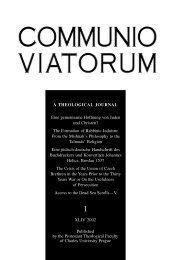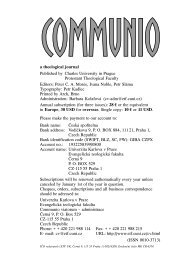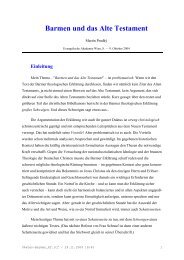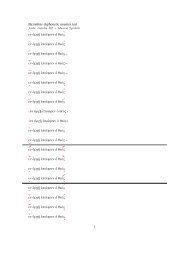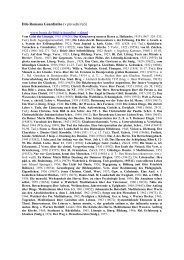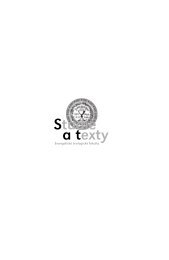A THEOLOGICAL JOURNAL XLIV 2002 Published by the Protestant ...
A THEOLOGICAL JOURNAL XLIV 2002 Published by the Protestant ...
A THEOLOGICAL JOURNAL XLIV 2002 Published by the Protestant ...
Create successful ePaper yourself
Turn your PDF publications into a flip-book with our unique Google optimized e-Paper software.
TONY CARROLL SJ<br />
The question of secularisation is fur<strong>the</strong>r complicated <strong>by</strong> <strong>the</strong> fact<br />
that <strong>the</strong> phenomena of religious belief and practice is specific to <strong>the</strong><br />
cultural context in which it occurs. As Theodore Caplow argues,<br />
whilst post-World War II religious belief and practice has declined in<br />
many European countries no significant decline in religious belief or<br />
practice has occurred in <strong>the</strong> United States in <strong>the</strong> same period. 9 If that<br />
were not complicated enough, <strong>the</strong>re is also <strong>the</strong> question as to just<br />
what qualifies for religious belief and practice and how one measures<br />
this. 10 Fur<strong>the</strong>rmore, <strong>the</strong>re is <strong>the</strong> phenomenon today that, as Grace<br />
Davie puts it, people in Great Britain believe in God but do not belong<br />
to a particular Church. 11 O<strong>the</strong>r countries follow <strong>the</strong>ir own patterns<br />
of secularisation with <strong>the</strong>ir own particular histories and forms<br />
clude in philosophy: Gianni Vattimo, (Ed.) Filosophia ë86, Rome, Gius Laterza &<br />
Figlia, 1986; Gianni Vattimo, Credere di Credere, Rome, Garzanti, 1996; Philippa<br />
Berry and Andrew Wernick (Eds.) Shadow of Spirit: Postmodernism and Religion,<br />
London, Routledge, 1992; Dominique Janicaud, Le tourant thÈologique de la phenomenology<br />
franÁaise, Eds de líÈclat, 1991;Jean-Louis ChrÈtien, Michel Henry,<br />
Jean-Luc Marion, Paul Ricoeur, (Eds.) PhÈnomenologie et ThÈologie, PrÈsentation<br />
de Jean-FranÁois ChrÈtien, Paris, Criterion, 1992. In sociology: Franz-Xaver Kaufmann,<br />
Religion und Modernit‰t, T¸bingen J. C. B. Mohr (Paul Siebeck), 1989; Niklaus<br />
Luhmann, Die Religion der Gesellschaft, Frankfurt, Suhrkamp, 2000; Danièle<br />
Hervieu-LÈger et Jean-Paul Willaime, Sociologies et Religion: Approches classiques,<br />
Paris, PUF, 2001; JosÈ Casanova 1994 op cit. In <strong>the</strong>ology: John Milbank, 1990 op<br />
cit; Philip Blond, (Ed.) Post-Secular Philosophy: between philosophy and <strong>the</strong>ology,<br />
London, Routledge, 1998; Ca<strong>the</strong>rine Pickstock, After Writing: on <strong>the</strong> Liturgical<br />
Consummation of Philosophy, Oxford, Blackwell, 1998. In history: Hugh McLeod,<br />
Secularisation in Western Europe, 1848ñ1914, New York, St. Martinís Press, 2000;<br />
Hartmut Lehmann (Ed.) S‰kularisierung, Dechristianisierung, Rechristianisierung<br />
im neuzeitlichen Europa, Verˆffentlichungen des Max-Planck-Instituts f¸r Geschichte†130,<br />
Gˆttingen, Vandenhoeck & Ruprecht, 1997; Claude Langlois, ëLa quantification<br />
en histoire religieuse. Un demi-siècle de pratiqueí, in: Líobservation quantitative<br />
du fait religieux, Colloque de líAssociation FranÁaise díHistoire Religieuse<br />
Contemporaine, Lille, 1992, pp. 17ñ34.<br />
9 Theodore Caplow, The 1984 Paul Hanley Furfey Lecture: Contrasting Trends in<br />
European and American Religion, in Sociological Analysis, 1985, 46:2, pp. 101ñ108.<br />
10 On this question see Reinhard Henkel, Atlas der Kirchen und der anderen Religionsgemeinschaften<br />
in Deutschland-eine Religionsgeographie, Stuttgart, Verlag<br />
W. Kohlhammer, 2001, pp. 22ñ37.<br />
11 Grace Davie, Religion in Britain since 1945, Oxford, Blackwell, 1994, pp. 93ñ116.<br />
Grace Davie has recently modified her view on <strong>the</strong> weakness of institutional religion<br />
in Europe and introduced <strong>the</strong> notion of ëvicarious religioní to suggest that although<br />
people may not attend churches <strong>the</strong>y often consider churches to be acting for <strong>the</strong>m in a<br />
variety of ways. See Grace Davie, ìThe persistence of institutional religion in modern<br />
Europeî, in Linda Woodhead, Paul Heelas and David Martin (Eds.) Peter Berger and<br />
<strong>the</strong> Study of Religion, London, Routledge, 2001, pp. 100ñ111.<br />
254



